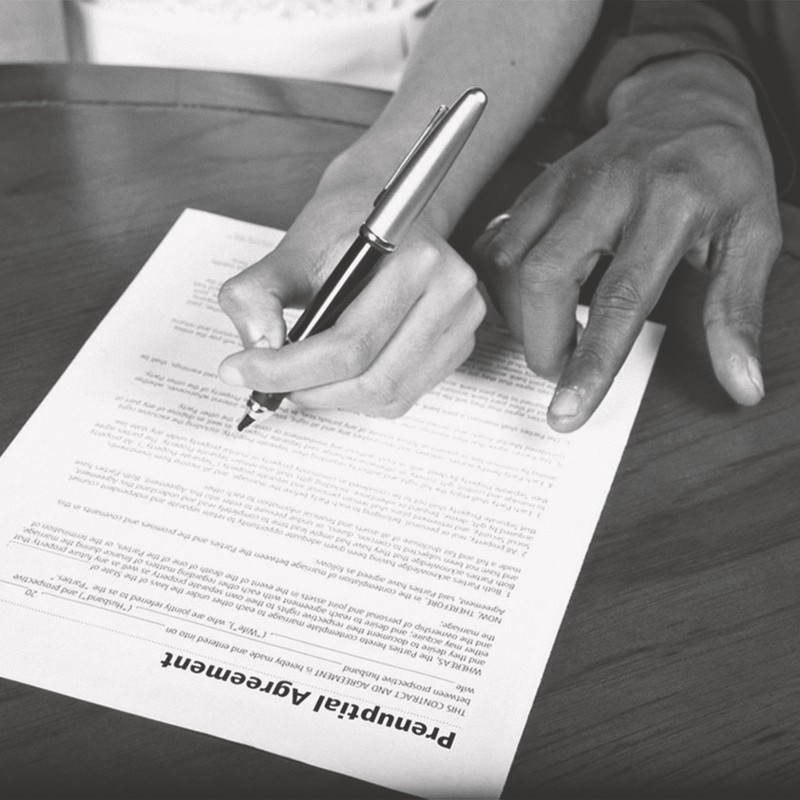
Should You Get A Prenup?
First things first – what actually is a prenup?
“A prenup is an agreement entered into before marriage which sets out how a couple would like their finances to be divided in the event of a divorce,” explains Carrie. “They are not currently binding in England and Wales but are usually taken into account upon divorce – especially if certain criteria is met.
“In summary, the main criteria are:
-
The agreement must be freely entered into.
-
Both parties must have a full understanding of the implications of the agreement.
-
The agreement must be fair in the circumstances prevailing. This includes ensuring that both parties’ reasonable needs are met (which are different in every case), particularly those of any children. A prenup that says that one party is to receive nothing upon divorce is unlikely to be upheld, because this would not meet that individual’s needs.”
Jane adds: “If the couple do not intend to marry within 12 months, they should consider entering into a Cohabitation Agreement instead, to regulate the terms of their financial relationship. The family courts in England and Wales are increasingly upholding the terms of carefully drafted and negotiated pre-nuptial agreements, provided that the following conditions have been satisfied:
-
The couple have both received independent legal advice from their own solicitor on the terms of the pre-nuptial agreement prior to signing the agreement.
-
The pre-nuptial agreement is signed at least 4–6 weeks prior to the wedding date.
-
The terms of the agreement are fair and reasonable with a review clause in the event of a significant change in circumstances.
-
Neither party has been placed under unfair pressure or duress to enter into the agreement.
-
The parties have each provided full and frank financial disclosure to each other, and each party has had an opportunity to raise questions on that disclosure and have those questions answered.
-
The parties intend to enter into a legally binding agreement. If the agreement is made by deed and contains a statement signed by the parties that they intend to be bound by it, it is likely that the family court would uphold the agreement provided the other criteria have been met.”
When and why would you need one?
“Ideally, your agreement needs to be signed around four to six weeks prior to your wedding date,” says Jane. “This means solicitors for both parties need to be instructed several months ahead of the wedding to leave enough room to negotiate and draft the terms of the agreement. Prenuptial agreements are effective in protecting wealth acquired prior to marriage. If you are wealthier than your fiancé(e), you should seriously consider entering into a prenuptial agreement.
“If you have accumulated wealth prior to your marriage and wish to safeguard your child’s inheritance from a previous marriage/relationship, it is beneficial to enter into a pre-nuptial agreement to clarify who gets what in the event of the marriage.
“The family courts in England and Wales have a wide discretion to distribute wealth on divorce and to make orders that one spouse pays maintenance to the other. A carefully drafted prenuptial agreement clearly sets out the terms agreed between the parties should their marriage fail, and thereby avoid the cost of expensive and protracted litigation.”
Carrie adds: “It is usually the wealthier party who suggests a prenup in order to protect their finances in the event of divorce. However, it’s a misconception that prenups are only for the very rich. Often people want a prenup for one of the following reasons:
-
If they own shares in a family business, they and their family might not want these to be subject to division in the event of divorce.
-
If people meet later in life and one or both of them have children from a previous relationship, they may wish to protect pre-acquired wealth so it can be inherited by their children.
-
If one or both parties have family wealth which they have or will inherit, people often don’t want this to be divided in the event of divorce.
-
If the marriage needs to take place more quickly than it otherwise might for religious or immigration reasons.
How should you go about getting one?
“Contact a family solicitor with a good reputation and arrange a meeting to talk through your requirements and what you want to achieve,” advises Carrie. “This will initially be a one-off meeting during which options can be discussed, and a way forward agreed. You can then decide whether you would like to go ahead.”
“The couple would each need to appoint their own solicitor to negotiate, draft and advise on the terms of the pre-nuptial agreement,” explains Jane. “A list of specialist family solicitors is available at Resolution. Resolution is an organisation of family law professionals committed to resolving family disputes in a constructive, non-confrontational way. It is not possible for a solicitor to act for both parties. It is important that each party receives separate, independent legal advice.”
DISCLAIMER: We endeavour to always credit the correct original source of every image we use. If you think a credit may be incorrect, please contact us at [email protected].

